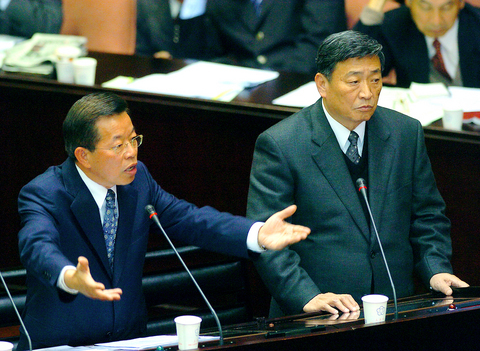The Ministry of National Defense yesterday launched a new campaign promoting the NT$610.8 (US$19.8 billion) bill to procure arms from the US to coincide with the opening of the new legislative term.
"The new wave of publicity skirts sensitive political issues and focuses instead on the significance of national security. We hope to win greater public backing," Political Warfare Department director-general Hu Chen-pu (
He admitted that last year's campaign urging people to "save a cup of tea every day in exchange for weapons" sparked controversy and did little to facilitate passage of the bill.

PHOTO: FANG PING-CHAO, TAIPEI TIMES
Hu said China has just released its annual military budget, which features a 12.5 percent increase in spending on last year.
But China is thought to conceal a large amount of additional military spending within other budgets, so foreign observers have estimated the country's actual military spending at two to three times the official figure, Hu said.
The nation therefore cannot ignore the tipping of the cross-strait military balance, he said.
Hu said the new campaign relies on expert opinion that aggressor nations with three times the military force of a vulnerable nation will win in any conflict, that two times the military force will mean the result is uncertain, but that if the figure is less than one-and-a-half times, victory is not possible.
Ministry research found that the procurement of the desired weapons would close the military gap with China to a factor of 1.67, thereby ensuring Taiwan's security for about 30 years.
Hu said that while some legislators were keen on the idea of approving the arms deal through a referendum, defense issues were a professional matter not suited to a plebiscite.
The new campaign also uses former US president Ronald Reagan's famous words "peace through strength" and the Chinese proverb "no eggs are unbroken when the nest is overturned" on its posters.
The campaign says the procurement package keeps Taiwan up to speed with the rest of the world.
It asks why the US, Japan and the Netherlands purchased Patriot Advanced Capability-3 (PAC-3) missile batteries, why 16 countries, including Japan and South Korea, use P-3C maritime patrol aircraft, and why China strongly opposes the sale of US submarines to Taiwan. The reply is that these are advanced arms.
Hu said the ministry will adopt a three-pronged strategy targeting the public, legislative caucuses and individual legislators to increase understanding of the issue. The campaign will run in newspapers and on TV, as well as on buses and the MRT in Taipei.
Minister of National Defense Lee Jye (李傑) has announced that the NT$610.8 billion weapons procurement expenditure could be cut down to NT$590 billion, reflecting the weakness of the US dollar, and even reduced to NT$480 billion if Taiwan elects not to purchase eight diesel submarines from the US.
However, opposition legislators have asked the ministry to cut the budget by at least NT$380 billion.
The biggest-ever weapons procurement plan in the nation's history would purchase three major items -- three PAC-3 missile batteries, 12 P-3C maritime patrol aircraft and the eight diesel-powered submarines.

Weather conditions across Taiwan are expected to remain stable today, but cloudy to rainy skies are expected from tomorrow onward due to increasing moisture in the atmosphere, according to the Central Weather Administration (CWA). Daytime highs today are expected to hit 25-27°C in western Taiwan and 22-24°C in the eastern counties of Yilan, Hualien, and Taitung, data on the CWA website indicated. After sunset, temperatures could drop to 16-17°C in most parts of Taiwan. For tomorrow, precipitation is likely in northern Taiwan as a cloud system moves in from China. Daytime temperatures are expected to hover around 25°C, the CWA said. Starting Monday, areas

A Taiwanese software developer has created a generative artificial intelligence (AI) model to help people use AI without exposing sensitive data, project head Huang Chung-hsiao (黃崇校) said yesterday. Huang, a 55-year-old coder leading a US-based team, said that concerns over data privacy and security in popular generative AIs such as ChatGPT and DeepSeek motivated him to develop a personal AI assistant named “Mei.” One of the biggest security flaws with cloud-based algorithms is that users are required to hand over personal information to access the service, giving developers the opportunity to mine user data, he said. For this reason, many government agencies and

The National Fire Agency on Thursday said a series of drills simulating a magnitude 8.5 earthquake would be held in September to enhance the government’s emergency response capabilities. Since earthquakes cannot be predicted, only by continuously promoting disaster prevention measures could Taiwan enhance its resilience to earthquakes, agency Director-General Hsiao Huan-chang (蕭煥章) said in a news release. The exercises would be held to mark annual National Disaster Prevention Day on Sept. 21, the aim of which is to test Taiwan’s preparedness and improve its earthquake resilience in case of a major temblor, Hsiao said. As part of those drills, an earthquake alert would

STRICTER ENFORCEMENT: Taipei authorities warned against drunk cycling after a sharp rise in riding under the influence, urging greater public awareness of its illegality Taipei authorities have issued a public warning urging people not to ride bicycles after consuming alcohol, following a sharp rise in riding under the influence (DUI) cases involving bicycles. Five hundred and seven people were charged with DUI last year while riding YouBikes, personal bicycles, or other self-propelled two-wheelers — a fourfold increase from the previous year, data released by the Taipei Police Department’s Traffic Division showed. Of these, 33 cases were considered severe enough to be prosecuted under “offenses against public safety,” the data showed. Under the Road Traffic Management and Penalty Act (道路交通管理處罰條例), bicycles — including YouBikes and other